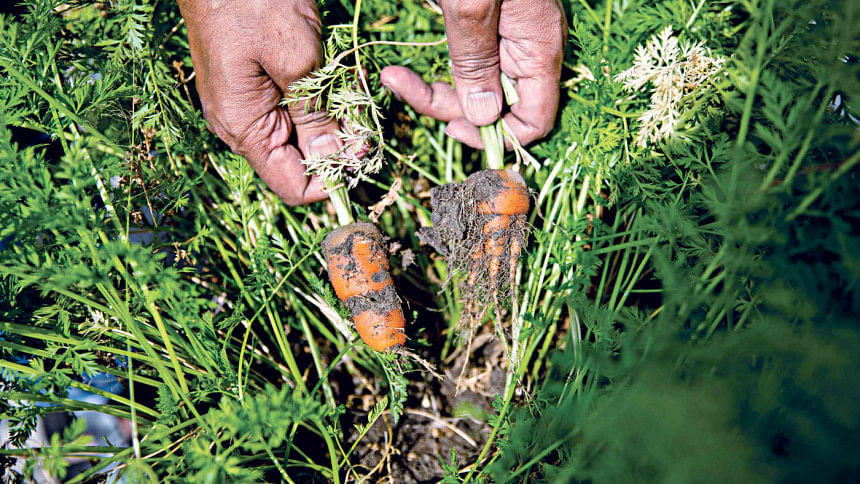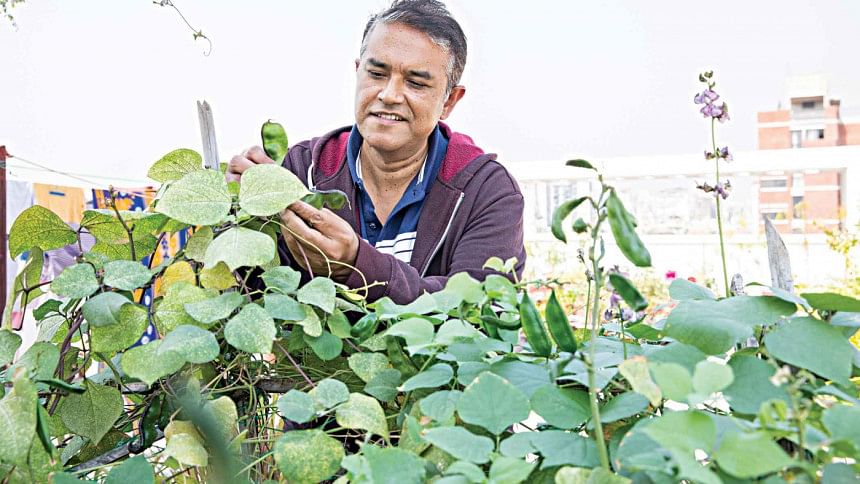The young and educated farmer Key to revolutionised agriculture

If you have bought locally grown strawberries, or dragon fruit, or the out of season bottle gourd, and the luscious Thai guava all year round, you are already a beneficiary of the silent agri-revolution happening in Bangladesh. For any observant consumer, the leaps and bounds advancement in food crop production needs no explaining, as well as its contribution to improved livelihoods and reduced poverty. According to the World Bank, agriculture accounted for 90 percent of the reduction in poverty in the five-year span from 2005, and food grain production in the country tripled between 1972 and 2014, demonstrating a growth rate second only to China.
But even as different organisations collect and tabulate all sorts of fantastic data on growth and impact, often unnoticed is a more subtle change in attitudes in the agriculture sector and the profession of farming, which spans, but is not limited to, grains, vegetables, fruits, spices, fish, poultry, and cattle!
A large part of the credit definitely goes to the Department for Agriculture Extension and their grassroots level work, but a significantly large portion of praise can also be placed on non-government donor organisations as well as the purely private sector efforts for introducing technology to agriculture in more innovative ways. Most of the changes in this sector can be seen in terms of information technology, access to finance, innovation in farming techniques, market linkages and of course, improved access to mechanisation leading to higher efficiency.
The agriculture sector has shrunk as a stakeholder in the total economy, but it has in fact increased manifold in size in terms of output produced and its value, keeping up with the needs of an ever-growing population in this country.
In terms of exotic
As per the FAO, Bangladesh is the tenth largest tropical fruit producer in the world! Over a span of two decades, Bangladesh's fruit production been increased by 11.5 percent on average annually, according to its estimates. With free-flowing information and wider access to the Internet, many young farmers are exploring their own curiosities, researching on and finding information on their own, often moving into non-traditional crops like strawberry, cashew nut, coffee, orange, avocado, custard apple, and dragon fruit.
Take for example Golam Nobi, a young farmer in Natore, who has 30 bighas of land under dragon fruit cultivation. His interest in the fruit developed after receiving some saplings from the government. Initially struggling to understand the needs of the plant, he took the initiative to seek more training, while doing a lot of self-learning through resources openly available on the Internet.
After finding out that Vietnam is the largest producer of the fruit, he sought government support to visit the cultivation there. Interestingly, he says that he saw that a significant portion of the crop there that year had been lost to water drainage issue.
Through his own observation, he figured out his own way to avoid that and expanded his own cultivation to such success that the next year an official from the Vietnamese agriculture department visited his farm to observe his innovative solution! He, along with his mentor Dr Rahim, were invited to Ho Chi Minh City to speak on the topic!

"Many young farmers are shying away from traditional crops and moving into different types of exotic as well enhanced versions of local fruits. This is just a sign of people adapting to changing times and seeking better lives", says Ahsan Rony, a pioneer in bringing unusual farming solutions through his organisation Green Savers.
Nasir Hossain, featured by the inimitable Shykh Seraj in his show Hridoye Mati O Manush, is another young farmer from Magura, who entered the farming profession after completing his graduation, despite having had no intentions and against his family's initial objections. He now has a farm over 45 bighas, with various types of fruits.
Similarly, endeavouring young farmers have also sought to grow various non-local vegetables like green broccoli, white broccoli, bell peppers, tomatoes, bok choy, squash, French bean, celery, Thai basil, lemon grass, sweet corn and various such items all over farms in Bangladesh.
Many young people in the rural areas are now returning to farming as a respectable and sustainable source of earning, armed with their tech-savvy and wider world views.
In terms of organic
More awareness about health and the harmful effects of chemical fertilisers has made many young farmers think of better solutions. With the help of trainings provided by the Department of Agriculture Extension and under their various projects, as well as purely out of individual interest and passion, organic farming is gaining ground rapidly.
O' Natural Bangladesh, the organic food brand of Paramount Agro, is a recipient of the Bangabandhu National Agriculture Award-1423, which is the highest state recognition in the agriculture sector. It is one of the larger companies in the organic business, with a farm spread over 80 bighas in Fawgan, Gazipur. Their products include livestock, fish, dairy, vegetables.
There are other smaller organic farming endeavours like Shuddho Krishi by Kakoli Khan, Harvest Trading, and the hundreds of farmers cultivating vegetables on floating beds and small village plots all over Bangladesh.
On the other hand, there is a growing sector involving mechanised production of organic fertiliser and pesticides and even organic solutions to all things related to growing crops!
In terms of innovation
A number of young farmers in the low-lying wetlands have experimented with a new method of farming. In the areas known to get submerged during the monsoon, the farmers have used the abundantly available water hyacinth to create floating beds, and then used these as the base for cultivating various vegetables.
Many others are working with hydroponics, which simply put, is a way to produce fruits, vegetables and even cattle feed without the use of soil, or off the ground. Many of the organic produce growers are actually using hydroponics in specialised green houses to harvest large scale crops in short time, while maintaining good quality of the output as well!

In terms of it
Information technology and farming technology has truly made great contributions to the farming sector in Bangladesh especially in improving the quality of service and creating backward and forward linkages, as well as providing interesting solutions to traditional problems like farmer's access to finance, timely information and reaching the right consumers.
iFarmer is Bangladesh's first Deep tech Agriculture Platform focused on connecting farm funders with real farmers in order to increase food production and productivity. iFarmer has won the Fintech Award in 2019 from United Nations Capital Development Fund (UNCDF), the most recent blog post on the company website informs. It provides consultancy, scope for investment into farming by non-farmers, which are proving to be revolutionary ideas for the local industries, especially dairy. iFarmer has also recently secured a six-figure investment from Falcon Network and Accelerating Asia Ventures!
Free, timely, unbiased flow of actionable information and affordable technologies to optimise their production practices are the two key factors to change our smallholder farmers' status quo. Which producers have the most significant traction in the market, what is the market price trend of a particular crop, and is it efficient to invest in growing that crop, or should they cultivate something else that also has market demand and suit the status of their soil and surroundings — these are the high-value projections that farmers need to have before starting a season, Mashrur H Shurid, Chief Executive Officer of iPAGE — a Bangladeshi agri-tech impact start up — said to The Daily Star in September 2020. Just as this remains true, so do the efforts of these tech-heavy agriculture support companies and their efforts.
The access to technology has improved the lives of consumers and sellers in terms of easy access as well. Could anyone have imagined buying sacrificial cattle and fresh-from-the-river fish online even a decade ago? But all of that is not only true today, but even considered quite normal.
According to government data, in 2019, the agriculture sector contributed less than 15 percent of GDP, but employed nearly a third of the country's labour force. But more importantly, over the past decades, the sector has valiantly kept up with the ever-growing food demands of an ever-growing large population.
With the dedicated efforts of agricultural scientists, young farmers armed with advanced education, easy access to information and technology, and increasing innovation, Bangladesh's agriculture has kept stepping up to the challenges of growing more grain, more cattle and dairy, more fish, more vegetable, more spices, more fruits etc. It even has contribution towards forex earnings, in spite of its severely limited land resource. Now, isn't that a miracle!
Photo: Sazzad Ibne Sayed
Models: Fakhrul Abedin Milon and Sharmin Hossain (farmers at heart, bankers in profession)

 For all latest news, follow The Daily Star's Google News channel.
For all latest news, follow The Daily Star's Google News channel. 



Comments